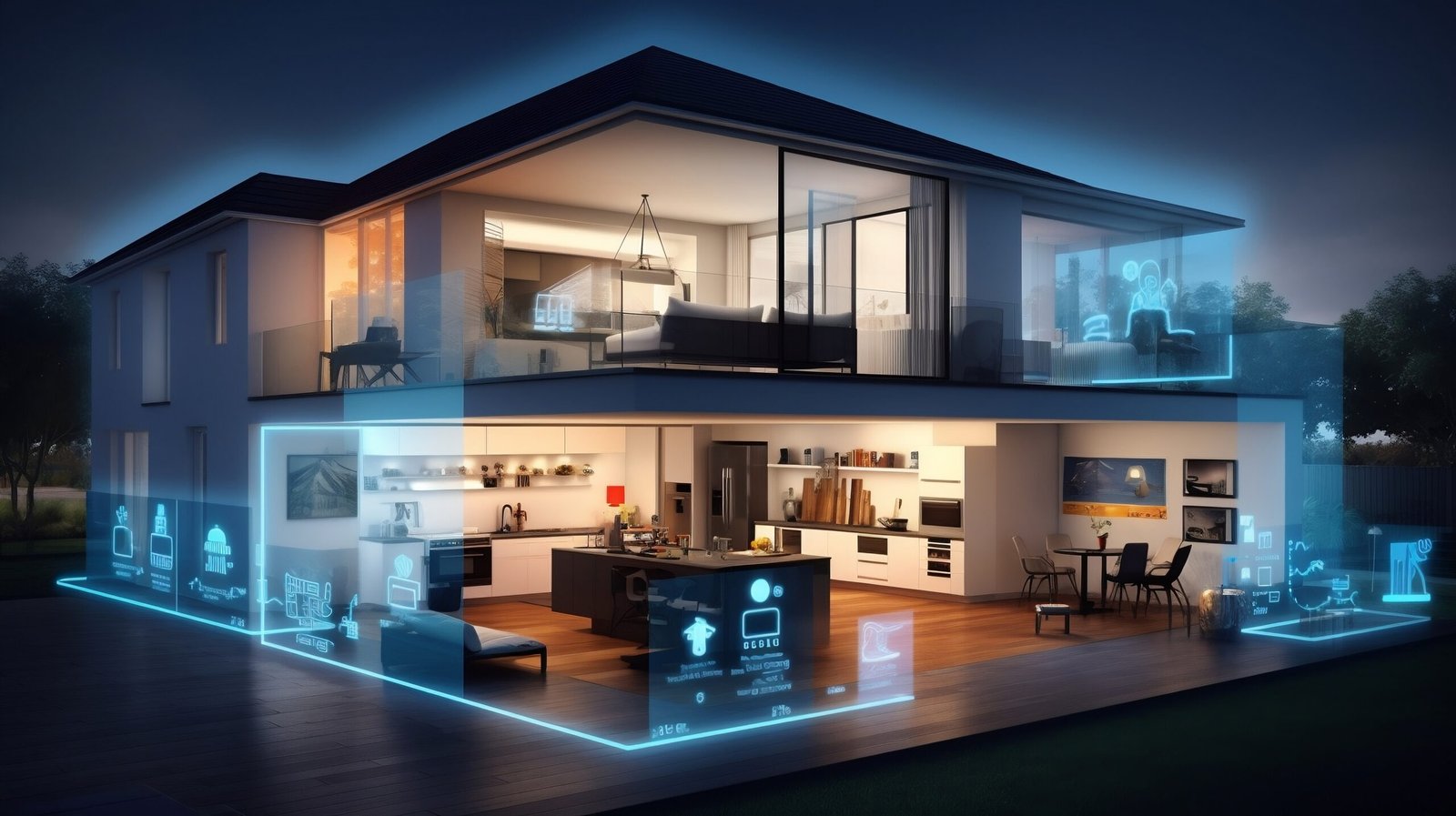As technology continues to revolutionise various sectors, the real estate market is no exception. Smart homes, equipped with the latest in automation, connectivity, and energy efficiency, are becoming an increasingly important feature in London’s property landscape. The future of smart homes in London’s real estate market promises to shape not only how people live but also how properties are valued, bought, and sold according to estate agents in London. Here’s a look at what the future holds for smart homes in the capital.
1. Rising Demand for Smart Home Technology
Shifting Buyer Preferences
As more people become familiar with smart technology, there is growing demand from both buyers and tenants for homes that offer the convenience, security, and energy savings that smart systems provide.
- Tech-Savvy Buyers: Younger generations, particularly millennials and Gen Z, are driving demand for properties that integrate advanced technologies. These buyers expect smart homes to include features like automated lighting, smart thermostats, and integrated security systems.
- Higher Rents for Smart Rentals: Tenants are increasingly drawn to rentals with smart home features, as these homes offer better security, energy savings, and the convenience of controlling household functions remotely via smartphones.
Integration with Sustainability Goals
With London’s focus on reducing carbon emissions and improving energy efficiency, smart homes that include green technologies such as smart meters, solar panels, and energy-efficient appliances are becoming more popular.
- Energy Efficiency Standards: The UK government has set ambitious goals for reducing energy consumption and carbon footprints, and smart homes are part of this strategy. Properties that offer energy-saving features, such as automated heating systems or solar-powered energy management, are likely to become more valuable in the future.
2. Innovations Driving the Smart Home Trend
AI and Machine Learning in Property Management
Artificial intelligence (AI) and machine learning are set to play a key role in how smart homes function. Advanced systems can learn homeowners’ preferences and habits, adjusting lighting, temperature, and security settings automatically based on past behaviour.
- Personalised Living Experiences: AI systems can learn a family’s daily routines and adjust the home environment accordingly. For instance, smart thermostats can automatically adjust the temperature to suit the resident’s comfort level, and smart lighting systems can switch on or off based on presence.
- Predictive Maintenance: Smart homes can use AI to predict when appliances or systems may fail, allowing for preventive maintenance before major repairs are required. This will be particularly appealing to landlords and property investors, as it helps reduce long-term maintenance costs.
Integration with 5G and IoT
The rollout of 5G across London will significantly improve the connectivity of smart homes. Faster and more reliable internet speeds will enhance the capabilities of smart devices, leading to a seamless integration of Internet of Things (IoT) systems in homes.
- Fully Connected Ecosystems: With 5G, smart homes can host a wide range of IoT devices, from voice-controlled assistants to smart fridges and washing machines. This will allow for more complex home automation, such as managing energy usage across multiple devices or securing the home with a comprehensive security system that includes cameras, sensors, and alarms.
- Remote Monitoring and Control: Homeowners will have greater control over their homes even when they are not physically present. This includes being able to monitor security systems, adjust heating and lighting, and manage appliances from any location with an internet connection.
3. Impact on Property Values
Premium Pricing for Smart Features
Smart home technology is increasingly seen as a desirable feature that adds value to a property. In the future, properties with advanced smart systems are likely to command higher prices in London’s competitive market.
- Increased Property Values: Properties equipped with smart technology are often valued higher than those without. Buyers are willing to pay a premium for the convenience, security, and cost savings that smart homes offer, making these properties a solid investment.
- Attractive to Investors: Property investors are becoming more interested in smart homes because they can offer better rental returns. Smart homes are more attractive to high-earning professionals who value tech features, and as a result, these properties can generate higher rental income.
Enhanced Energy Performance Certificates (EPCs)
Energy performance certificates (EPCs) play a significant role in the valuation and desirability of homes in London. Smart homes that integrate energy-efficient technologies are likely to have higher EPC ratings, which can positively affect property values.
- Government Incentives: With increasing pressure from the government to meet energy efficiency standards, homes with higher EPC ratings may benefit from future incentives, such as reduced taxes or grants for improvements. Smart homes that integrate energy-saving technologies are more likely to benefit from these schemes.
4. The Developers Shape Future of Smart Homes
Smart Technology in New Construction Developments
Even property developers within London are already waking up to the booming need for smart homes and are integrating these technologies within new builds, considering them a standard. In the near future, this trend is going to increase because smart home technology is going to be mainstream.
Smart Houses: Many developers will now sell their new, intelligent houses-with the latest features pre-installed as a complete pack, including security systems, energy management, and house automation. Such houses, especially appeal to modern buyers who prefer tech-ready properties.
Sustainable Living: There is an increasing demand for green residences, and smart homes fit right in with that ideal. Developers can capitalize on this interest in sustainable living by incorporating energy-friendly systems into new constructions.
Retrofitting Older Homes
The future of smart homes is not only in new builds, but retrofitting older properties with smart technologies makes the possibilities easier and more cost-effective, in turn allowing existing home owners to update their homes and add value.
Smart Renovation: Older homes are upgraded with smart technology, for instance smart thermostats, smart lighting systems, and smart security features. Upgrading with such cutting-edge technology appeals to tech-savvy buyers and renters. That is another factor that contributes to upgrading rental income without buying new property.
Increasing Attractiveness of Period Properties: In a city like London, where period properties are always sought after, retrofitting smart technologies can provide the perfect blend of old-world charm and modern convenience, making these homes stand out in the market .
5. Challenges and Considerations
Data Privacy and Security Concerns
Of course, the one major challenge for the future of smart homes is data privacy and security. Just as people are becoming more and more connected at home, so is their home considerably more vulnerable to cyberattacks or even data breaches.
Security Systems Vulnerability Smart security systems, such as camera, locks on doors, and even alarm systems, would be exploitable in terms of hacking if protection is not provided. All the gadgets must be secure and install software updates.
Data Privacy Regulation: Home owners have to be informed about how personal data is used in home smart devices. Manufacturers and technology supplier will need to focus major on data protection and data privacy laws.
Installation and Operating Expenses
The benefits of smart houses are evident, but installing them can be costly for some customers due to the high costs involved in setting up at the beginning.
Smart systems require higher investment and maintenance expenses in terms of upgrading services as well as replacement in the long run.
Higher Initial Investment: Smart homes generally come with a higher initial investment cost, mostly on sophisticated techniques like integrated energy management and comprehensive home automation.
Maintenance: Smart homes rely on updates and maintenance for them to function effectively. The owners should be willing to spend time and resources to keep the systems updated in order to achieve smooth running.
Conclusion
In the London real estate industry, smart homes have the future very bright going by the demand for convenience, security, and sustainability. As the technology advances, smart homes will become an integral part of new buildings and refurbishment. From property value improvements to intelligent and tech-savvy buyers and tenants, smart homes will be the future of the London property market. However, it will require careful management of data privacy, security, and cost of adoption as the market grows.



